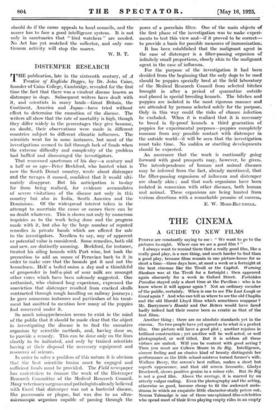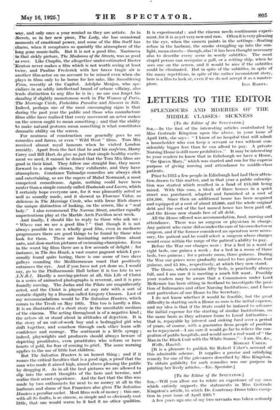THE CINEMA
A GUIDE TO NEW FILMS
PEOPLE are constantly saying to me : " We want to go to the pictures to-night. Where can we see a good film ? "
I always want to remind them that a really good film, like a really good play, is a rare thing, and much harder to find than a good play, because films remain in one picture-house for so short a time—three days here, at most a week or a fortnight at the best cinemas like the Tivoli or the Capitol. Warning Shadows was at the Tivoli for a fortnight ; then appeared again obscurely for a week in Oxford Street. Forbidden Paradise stayed only a short time at the Pavilion : who is to know where it will appear again ? Not an ordinary member of the public, certainly. When is one to see The Last Laugh or Greed again ? And who can tell us where to see the old Chaplin and the old Harold Lloyd films which sometimes reappear ? Mr. Barrymore's Hamlet and Our Betters would have fared badly indeed had their course been as erratic as that of the best films.
Another thing : there are no absolute standards yet in the cinema. No two people have yet agreed as to what is a perfect film. One picture will have a good plot ; another rejoices in brilliant construction ; yet another will be well acted, or well photographed, or well titled. But it is seldom all these virtues are united. Will you be content with good acting ? Then you must see Colleen Moore in So Big. Intelligence, sincere feeling and an elusive kind of beauty distinguish her performance as the little school-mistress turned farmer's wife. Wallace Beery, the screen's best ruffian, makes a short but superb appearance, and that old screen favourite, Gladys Brockwell, shows positive genius in a minor role. But So Big is not a good film. Above the average, it is marred by an utterly vulgar ending. Even the photography and the acting, otherwise so good, become cheap to fit the awkward melo- drama in which an exquisite little character-study peters out. Norma Talmadge is one of those unexplained film-celebrities who spend most of their lives playing empty roles in an empty
way, and only once a year remind us they are artists. As in • Secrets, so in her new piece, The Lady, she has occasional moments of emotional power, and some of the film itself has charm, when it recaptures so quaintly the atmosphere of the long gone music-halls. But it is not a good film. Nazimova
I in that sickly picture, The Madonna of the Streets, was as good las ever. Like Chaplin, the altogether under-estimated Buster /:Keaton never makes a film which is not worth seeing at least twice, and Pauline Frederick with her brave tragic air is another film-actor on no account to be missed even when she , plays in films only to be borne for her sake, like Smouldering Fires, recently at the Capitol. Adolphe Menjou, who spe- cializes in an oddly intellectual brand of urbane villainy, also lends distinction to any film he is in ; no one can forget his dazzling if slightly monotonous work in The Woman of Paris, !The Marriage Circle, Forbidden Paradise and Sinners in Silk. Indeed, perhaps one of the most encouraging signs is that during the past year the public and those who manufacture films alike have realized that every movement an actor makes on the screen ought to mean something ; and that the ability to make natural gestures mean something is what constitutes dramatic ability on the screen.
For neatness of construction one generally goes to see comedies and farces, or even " Wild West " films. Tom Mix received almost royal honours when he visited London recently. Apart from the fact that he and his confreres, Harry Carey and Bill Hart, do give us just that simple healthy excite- ment we need, it cannot be denied that the Tom Mix films are good in their kind. They follow one straight line, they move forward to a simple climax, they exhilarate, and they have atmosphere. Constance Talmadge comedies are always slick and entertaining, so are the capers of Mabel Normand, a most competent comedienne. Again, nothing could have been neater than a simple comedy called Husbands and Lovers, which certainly hope everyone saw, for it was pleasantly acted as well as soundly made, and it showed us Florence Vidor, so delicious in The Marriage Circle, who with Irene Rich shares the unique distinction of looking, on the screen, like a " real lady." I also recommend The Narrow Street, another equally unpretentious play at the Marble Arch Pavilion next week. And finally, I should like to reply to those who ask me : " Where can we see a good film ? " that though it is not always possible to see a wholly good film, even in mediocre programmes there are good things to be found by those who look for them. There are fascinating nature-films about ants, and slow-motion pictures of swimming-champions. Even in the worst big films there are a few seconds of delight : for instance, in The Sea Hawk, a vast coarse pageant which I per- sonally found quite boring, there is one scene of two slave 'galleys rounding the Mediterranean coast that positively entrances the eye. And if you have not yet done so, I would say, go to the Philharmonic Hall before it is too late to see .I.N.R.I. Hardly a moving-picture at all, this Life of Christ in a series of animated photographs is reverent, and it is pro- foundly moving. The Judas and the Pilate are magnificently acted, and the Christ is played at any rate with a sort of ecstatic dignity by a Russian called Gregory Chmara. Last of my recommendations would be The Salvation Hunters, which
comes to the Tivoli on May 18th. This too is hardly a film. It is an illustration of a short story in the unsuitable medium of the cinema. The acting throughout is of a negative kind ; the actors sit or stand about in attitudes of dejection. It is the story of an out-of-work boy and a bedraggled girl who drift together, and somehow through each other learn self- confidence and courage. The sentiment is a little syrupy ; indeed, playwrights and producers should always beware of depicting prostitutes, even prostitutes who reform or have hearts of gold, for fear of coming to grief. The same warning applies to the use of little lost children.
But The Salvation Hunters is an honest thing ; and if it rouses the critical faculties that is a good sign, a proof that the man who made it aimed high, aimed above pleasing the public by drugging it. As in all the best pictures we are allowed to slip into the secret thoughts of the hero and heroine, and realize their secret experience. And the fact that the film was made by two enthusiasts for next to no money at all in the harbours and slums of San Francisco also gives The Salvation Hunters a peculiar cachet. Most films reek of money : this one, with all its faults, is so sincere, so simple and so obviously cost little, that one would warm to it had it no other qualities. It is experimental ; and the cinema needs continuous experi- ment, for it is as yet very new and raw. Often it is very pleasing to the eye, when the camera paints in the settings—floating refuse in the harbour, the smoke struggling up into the sun- light, mean streets—though, alas ! it has been thought necessary also to describe every scene in wordy subtitles. The most stupid person can recognize a gull, or a rotting ship, when lie sees one on the screen, and it would be nice if the subtitles could be eliminated. But in spite of the subtitles, in spite of the many repetitions, in spite of the rather inconsistent story, here is a film to look at, even if we do not accept it as a master-











































 Previous page
Previous page